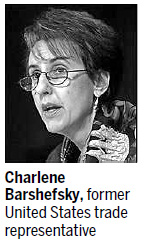Economy
Security issues shouldn't deter China investors
By Cai Xiao (China Daily)
Updated: 2011-06-12 08:22
 |
Large Medium Small |
Tianjin - Charlene Barshefsky, a former United States trade representative, said on Saturday that the US may have too many national security concerns about foreign investment in certain fields, but Chinese investors should be determined to come.
"I think the issue for the US, as for many countries including China, are certain sectors which are viewed as highly sensitive for national security reasons," Barshefsky said, adding that oil and gas and telecom are the most sensitive.

According to Barshefsky, the US does not review investment on economic security grounds, only on national security grounds.
She explained that fewer US economic agencies and more defense agencies participate in the review, so it is not an economic statement when a Chinese enterprise is turned down.
"This is an area the US and China should discuss," Barshefsky said.
Chen Deming, Chinese Minister of Commerce, said in May that Chinese investment in the US is not popular, largely because of the US security review regime.
China's total non-financial investment overseas in 2010 amounted to $59 billion, with only 2.4 percent in the US, China Business News reported.
A series of Chinese enterprises failed to pass the review of the Committee on Foreign Investment in the US (CFIUS), a group headed by the Treasury Department which conducts regular screenings on Chinese firms trying to expand in the US through mergers and acquisitions.
China National Offshore Oil Co failed to acquire a US oil company. A Chinese steel company did not succeed in investing in the US deformed steel bar industry. Chinese electronic products supplier Huawei Technologies Co Ltd was told it could acquire a small US electronic firm, but two years later, it was told to "withdraw".
Barshefsky added that many sectors in the US are not sensitive and they look forward to investment from China.
"Chinese enterprises should not regard difficulties met at the beginning as serious problems, or reduce these to different political philosophies."
She noted that when Japanese companies started to invest in the US in the 1970s, it was equally controversial, and not welcomed by the Americans.
"Japan is one of the largest investors in the US today," Barshefsky said. "So sometimes you take it as, 'Well, the public will get used to the idea'," she said, when the benefits become clear.
Barshefsky said when companies invest in a foreign country, they must be familiar with the laws and regulations at both national-level and state-level regulations.
"My advice to China: We could adjust our approval procedures; we could negotiate when the foreign investment is coming, we could find the solutions together," Barshefsky said.
She added that China and US should talk before announcing their intention to negotiate, because once the discussion becomes public, it is inevitably limited.
Rong Xiaozheng contributed to the story.